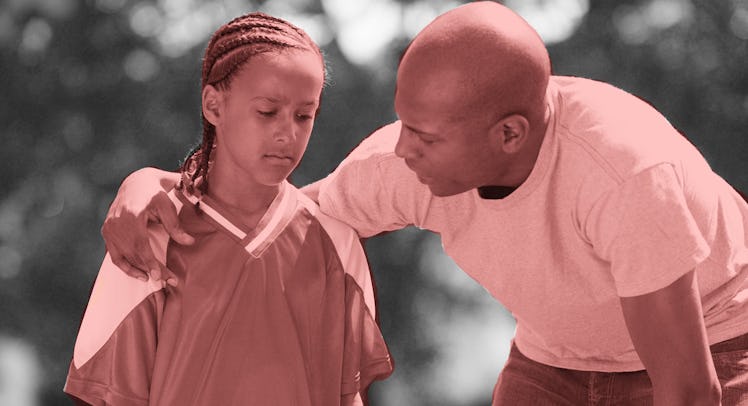Trump Is a Sore Loser: Teach Your Kids How to Lose Gracefully
Kids will lose. Here's how you can help them develop the grace to shrug it off and focus on fun.

In his refusal to concede the election despite it being fairly called for Joe Biden, President Trump continues to highlight a glaringly obvious fact: the man is a sore loser. This comes as no surprise. Trump built his platform on the fact that he is a winner, never a loser. During his Presidency, he regularly referred to opponents, fired cabinet members, and countless others as losers. There’s a very large chance he won’t ever concede, graciously or otherwise. The art of losing is one he’s never practiced let alone mastered. He’ll continue to spout baseless comments about voter fraud, to talk about rigged elections, to claw at the very fabric of our democracy if it saves his fragile ego. To him, losing is failing. He views it as an attack on his very core. It is obvious that the stench of loss is too overpowering, and he will do anything to clean himself of it.
It’s a repugnant example to set for children, and parents would be smart to use it as an example of how not to lose. Any preschool playground will prove that many kids are hardwired for competition. But the games kids engage in also prove that they’re not, to put it lightly, the most gracious losers. No matter how arbitrary the loss, naturally competitive children tend to not take it well. It’s incumbent upon parents, then, to raise children who approach competition with healthy attitudes and to teach kids how to not be sore losers. Competition is a constant in life, from t-ball practice to the boardroom. If a child doesn’t learn how to be a gracious loser, they’ll miss out on a major life skill. Happily, lessons in losing start at a very early age. Often even before a child can verbally communicate.
“Kids are going to lose a lot in their lives,” notes Dr. Jim Taylor, sports psychologist and author of Train Your Mind for Athletic Success. “People don’t like ungracious losers, which can hurt future relationships in sports and in life.”
Dr. Taylor, whose work includes consulting stints with the U.S. and Japanese ski teams, says that regardless of whether a child is naturally competitive or not, much of a child’s reaction to winning and losing is a reflection of how parents behave in competitive situations.
“Parents need to look in the mirror and see how they react to losing, or to their kids losing,” says Dr. Taylor. “Do they get really upset? If they send that message to their kids, their kids are going to adopt that.” Kids, he adds, become ungracious losers or sore losers when the very act of losing becomes an attack on them.
The solution, then, seems easy: Teach a kid to be a good sport by being a good sport. Show them that having fun, not winning, is the most important part of any competition at a young age. Piece of cake, right?
But it requires a parent to observe their own behavior a bit more closely. While most parents aren’t screaming at the ref during t-ball or demanding their child gets more lines during the school play, there are subtle acts, like a parent getting riled up and spiteful when their favorite football team botches a play that can show a child the wrong way to lose.
A mantra of sorts to remember: “Don’t ever act in a way you don’t want your kids to become,” advises Dr. Taylor.
From there, Dr. Taylor says, the work becomes far more proactive. “Parents need to be very conscious and deliberate, first of all about how they feel about their kids losing and what messages they’re sending,” he says. Because the fact is that competition is about relationships. Parents should stress to a kid that an opponent is there to make them better and push them on. A good opponent is a person who motivates a kid to reach their potential. They are, in a way, an ally more than an enemy.
“But also, just keep it in perspective,” Dr. Taylor says. He notes that parents should always rely on the power of a shrug. Saying something along the lines of ‘So what? You lost. You’re going to lose a lot. That’s not why you’re out there. You’re out there to have fun and do the best you can.’
But for many parents, that shrug should be internalized. Dr. Taylor points to a study by NPR, the Robert Wood Johnson Foundation, and the Harvard T.H. Chan School of Public Health that found that 26 percent of parents of high school athletes believed their children would go on to become professionals and Olympians. “The actual number is many zeros to the right of the decimal point,” he says.
In reality, Dr. Taylor says, advanced competitive sports shouldn’t even enter a child’s experience until pre-teen years, and 70 percent of school athletes drop out due to the stress and lack of fun. The system creates heightened competition, which in adolescents can result in heightened reactions to victory as well as defeat.
In a perfect world, Taylor says, all competitions should be fun, learning experiences — where parents take opportunities to teach the value of losing as well as the way to be a gracious winner. With patience and self-reflection, parents can equip their children to enjoy both winning and losing, and to handle both with a degree of humility.
This article was originally published on